Record reviews.
Here are some old reviews that I'd written over the years. I figured it was time to rescue some of this from the bottom of my drawers.
From DESTROY WHAT BORES YOU ZINE:
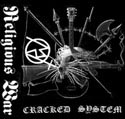
Religious War – Cracked System 12”
My friends and I occasionally sit around and kill a boring evening by talking about some of the things that make life worth living: cauliflower, Rothko, girls, graffiti, Frank Discussion, and which flavors of those jelly beans in the next room are the best (definitely NOT the popcorn flavor). Of course, we’re all obsessed with music, and it just wouldn’t seem right if we didn’t throw a few records on the turntable and have them dominate the conversation. Usually we end up pulling out Discharge and The Insults before coming up with the bright idea to listen again to Hellen Keller’s “Surfin’ with Steve and ED Amin”, maybe the most outrageous commercial jingle to be passed off as a punk song ever recorded–so annoying and stupid that it hurts to admit you like it, but so catchy and punk that you’d have to be dumb not to. This particular night was probably at about this point when Stu’s face lit up and he made the mad dash to his pile of newly acquired records. In one movement he pulled the disc from the sleeve and threw the record on the turntable and the sleeve at me, “just look at it!” The cover was a black and white (mostly black) abstract graphic of barbed wire, a soldier, rows of bullets, and the band name, Religious War. The catalog number on the back was “Sex 01” and the inside foldout was a collage of guns, studs, and dildos. The music playing was fucked and furious, the obvious product of a handful of record collections that start (and probably stop) with Discharge, Motorhead, Confuse, Sacrilege, and a Maiden record or two. This was recorded with top of the line broken pawnshop equipment on third generation reels. No frills, no games, no fucking around. And it was fucking great.
Before I could catch my breath he pulled out a second EP and showed it to me. Again, the sleeve was great—a bomb blast on front, flip it over and see a photo of planes dropping bombs, on, appropriately, After The Bomb records. As if by divine intervention (thanks, Cal), the record had all the dumb qualities that always turn me on: three songs, big hole, blank, stamped label, black vinyl, and at least two of the members are wearing Discharge shirts in their photos. I commanded my pal to put the record on, NOW. “Asylum” starts with a few loud, distorted notes that form the foundation for the song. The reverb is turned way up and the vocals are louder and more distorted than the guitar. Feedback screeches between the crudely played solos and screamed Ooh’s. The record is mastered loudly and the sound jumps off the turntable; this was the actualization of the potential greatness in the first EP.
As the noise dies down Stu gave me a look. I was in awe; this was the ultimate DIY hardcore record—“I NEED this.” He replied, “There were only 200 pressed of each; I have two of each. I’m not getting rid of my doubles. Good luck.” I fucking hate my friends.
And so the search began. I got in touch with the kid who put out the records, who told me both were sold out, but “I’ll look out for a copy in the stores if you want.” I did, but he never wrote back.
As my search continued we got some great news: Religious War had just recorded an LP for Mind Control. The rumors began to trickle in and the record slowly built itself to legendary status, at least to the few of us who’d heard the EPs. The first story was that when they recorded this, the amps were turned up loud enough, and were using enough energy that at some point they caught fire. Even better was that the band ignored the fire and kept playing until they finished recording. I don’t know if that’s true, but I hope it is.
The next rumor that I heard was that the band intended to send the tapes to the pressing plant without mixing. This was definitely false as the record ended up being remixed a ton of times as no one could agree how it should sound. The first tape I heard was raw as fuck, probably the initial, unmixed recording. That was my companion for over a year as I waited for the eventual release of the record. Following a long wait, they finally got a mix approved by enough people to put out. Of course, even after that was sent to press the band changed their minds and asked to the original, unmixed version to be used, but it was too late. Supposedly one of the band’s ideas was to put out two shit-sounding Eps, then follow it up with a top-shelf sounding full length. I think by the end they realized that the shit sound was far superior.
I realized that when the LP came out the spot would be blown on the genius of the band, which meant there’d be more than just a few people in search of those first EPs. In other words, I was in a position to find the records now or pay later. Endless searching paid off in a distro box in Baltimore and a record store in LA. It turns out both EPs were given the reissue treatment anyway, with Hardcore Holocaust helping out with “Asylum”, though even with that neither seems to turn up very often.
The “Cracked System” 12” was a departure with its foil embossed cover and glossy poster. The in-your-face minimalism gone from the packaging was echoed in this final mix of the recording. Compared to that tape I got way back when, the vinyl has a louder bass for a more “full” sound. The kick-drum and toms are pushed to the front and the cymbals, prominent on the tape, are all but lost in the mix. When the needle hit the vinyl I was totally let down. I want the noise-distortion-crash of the high end of sound to grab and pull me in, and having been used to what I think is a near perfect recording the loss of some of those elements was very apparent.
Despite being disappointed by the final mix, the music itself is absolutely top-notch—the solos more rehearsed, the ooh’s more frequent, the songs more anthemic. The album’s introduction is a punishing instrumental with explosion tracks dubbed in place of vocals. After the bomb, the record continues into a barrage of back against the wall hardcore brutality. “Green Bitch” is reprised from the debut EP, and fits in with the seven other, previously unreleased tunes. The record is over quickly—just short enough to turn out the lights, turn up the volume, and punch the walls. We’re all forced into 9 to 5 lives to get by, but old pals smile and acquiesce without any resistance. The rest of us fight to retain some dignity, fight depression and stagnancy. Some of us make music like this to try and make some sense out of things. And people say we’re crazy?
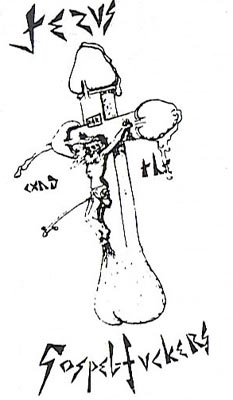 Jezus and the Gospelfuckers
Jezus and the Gospelfuckers / Agent Orange LP
Jezus and the Gospelfuckers' 1981 demo is the single best hardcore release never to be pressed on vinyl. After their demise, Jesus himself went on to play in Agent Orange, whose "Your Mother Sucks Cock In Hell" is one of the best ever hardcore EPs that did come out. They issued another fantastic EP, "VD", and recorded tracks for release on Pushead's "Cleanse the Bacteria" compilation. Those tracks were recorded without one member who then refused to allow the songs be credited to Agent Orange since he didn't perform thus they appear as Genocide Express tracks. Put all that material on one LP plus a few unreleased AO cuts and you have a record that is destined to be so great that it couldn't even be fucked up by the mediocrity of the releasing label, Kangaroo records.
In 1978 Holland punk was about being punk: having attitude, fucking with the straights, causing havoc. When the kids from Haarlem heard the Pistols and saw the mess they created, it was obvious there was no other way to live. As the brilliant liner notes explain, "...we stole money, worked in the flower bulbs, and bought expensive guitars and amps."
Drugs, alcohol, fighting, swastikas, riots--this was the life of the Gospelfuckers. Punk as they knew it was dying a slow, painful death caused by heroin, the politicization of punk, the lack of clubs, and the commercialization of punk. There had to be a change from the stagnation that was occurring. They still had the attitude of "live in a squat, play our music, and give a shit to a society we hated" but they were playing stale Pistols/Damned/Ivy Green influenced punk...until they heard the almighty: "Discharge”, Jesus writes, “completely changed our idea of music."
Still hated for hating their political peers, starting fights, and taking drug usage to the utmost levels of excess, the Gospelfuckers were back, tighter than ever, faster, with a rejuvenated line up. The classic demo was recorded in this time: nine brutal songs, fast and powerful with catchy melodies and a loud, crunching guitar sound with insane production. The at-times quirky lead guitar tracks add to the over-the-top-ness of the recording. All songs are utterly memorable, the indubitable documentation of angry, alienated youth articulated perfectly.
The volatile combo ultimately fell victim to their lifestyles. Love, drugs, and lifestyle changes marked the end of the band. Jesus met up with another band who had the same fuck shit up mentality as he did. Vallerie, the singer, attempted suicide on stage, members went to jail, and they were hated by all. Just like the good old days. Musically, Agent Orange is a direct continuation of the Gospelfuckers (including many of the same songs). Same loud guitar and song writing qualities that are even more distinct as a result of better recordings.
The first Agent Orange EP is on par with "Raped Ass" and "Pick Your King". The lead guitar is the loudest sound in the mix and the songs are full of brilliantly nonsensical leads. Perfectly executed tight, sloppy drumming and two sets of possessed vocals: the first deeper, angrily yelled, and the second the best female screams this side of the Comes. “Your mother sucks cock in hell” is the quintessential hardcore record.
The reissue LP has a horribly produced cover with pixilated versions of the Gospelfuckers logo (Jesus crucified on a cross of ejaculating penises) and first Agent Orange EP cover on either side of the jacket. It comes with a giant poster of the poorly reproduced Gospelfuckers graphic, and a comparatively nice booklet with pictures of the Gospelfuckers, the Agent Orange sleeves, and a wonderfully written history by Jesus that proves that the times may have changed but his attitude is still the same as when he was an impressionable 15 year old turned on to the Pistols attitude. I wish that the label understood the importance of this reissue and put a little more time into making it look nice, but the music speaks for itself in the long run. To say this record is essential is a gross understatement.
From Terminal-Boredom:
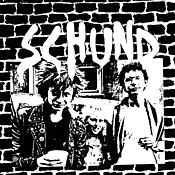
Die Böslinge & Schund LPs
When looking at worldwide punk scenes, it seems that people think of certain countries as standing out. Australia, Holland, and Sweden all gave birth to some amazing music and no punk can deny the brilliance of The Chosen Few, Nitwitz, or Hangover’s “Sick Society”. But while these scenes are well documented and high profile, others that are just as exciting get looked over. Maybe it’s because they tend not to sing in English, or maybe it’s because they never had a “Bloodstains Across…” comp to showcase the highlights.
Austria is at the top of the heap. Though the comp “Es Chaos is die Botschaft!” served as an excellent overview of the music, it got poor distribution (at least stateside) and left very little influence on today’s punk rock historians. The list of classic (or at least should-be classic) records from the country is astounding. Dirt Shit (whose sole EP is a strong contender for “top punk EPs of all time” honors), Chuzpe, Pöbel, Dead Nittels, Extrem, and the subjects here—Die Böslinge and Schund—all released records that stand up with the best.
Die Böslinge released one insanely good, and insanely rare, EP. The 3-song single, released in 1981, is a want-list staple that, with a pressing of a whooping 200 copies, is not being erased from those lists any time soon. It’s one of those records with a jangly guitar and loud, inept solos that go on for a few seconds longer than you’d think they should…and it’s fucking brilliant. The songs are simple and the melodies get stuck in your head for days; you end up singing along despite your lack of understanding of the language. At least I do. If you’re familiar with Germany’s PVC, think of their songs, slow them down, subtract a few years of guitar lessons, and that should give you a rough idea.
Höhnie Records in Germany recently did humanity a favor by issuing an LP by Die Böslinge, Scheiss Polizeistaat!. The A-side of the record compiles 9 songs from the band’s early days, all recorded in 1980. Included is the EP, as well as six unreleased tracks, including the best song here, “Polizeistaat”, which, I suspect, translates to “Police State.” (Punk rock themes are, indeed, universal!) The flipside of the record has eleven songs recorded in 2001-2002 by a slightly revised version of the old lineup. While odd that such a short-lived band would reform 20 years later, these tracks are decent enough. That’s not to say that they’re great, because they’re not. I listen to the A-side of this record 10:1 over side B, but it’s telling that an old band could get together so far removed from their heyday and make something true to their original vision.
Not content with pulling only one Austrian band out of obscurity (for the time being), Höhnie also reissued Schund. Like Die Böslinge, they released one record, a four-song EP in 1982. The Schund EP was pressed in an amazing (by Austrian standards where 200 was the industry standard) 500 copies, albeit with two sleeve variations. Musically, Schund were powerfully raw, catchy punk rock. Unlike the folks recording in the UK, there were no major labels or big budgets, nor, I assume, the desire to recreate the costly recordings of that country. Schund’s recordings are rough and ugly—the guitar has a loud crunch and the drums are buried and often sound as if they were recorded in the alley around the corner. The most immediate and noticeable thing are the vocals, distorted and urgently delivered by a punk rock beauty to rival Penelope.
This reissue follows the pattern of the Die Böslinge LP, where side A provides a look at the essential and side B is more disposable. The record opens with ten songs recorded in the studio in ’81, all of which are memorable. At times, the songs are proto-hardcore but never fast or mean enough to find classification alongside Discharge and company. The second half of this record is live material from ’82. The recording isn’t as great as the studio stuff, but not that much worse either. All but two of the songs are repeats from the A-side, which is a let-down. Still, the tunes are strong enough that it doesn’t hurt to hear them again.
Höhnie deserves applause for their reissues of these and other great European punk classics. I hope they and other labels will continue to find such great and overlooked music to reissue.
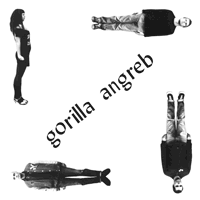
Gorilla Angreb EP
If I had to pick one guy who’s played on the most great punk releases in the past few years it would be Peter Bonneman. Others have been impressive, but Peter just leaves me in awe when I think about it. The obvious question that I have to answer is, “Who the hell is Peter Bonneman?” I’ll take the long route to answer that question.
It seems that a lot of heads have been turned lately by the two EPs by Sweden’s The Regulations. They’ve nailed an early US hardcore sound with good enough songs to even appeal to “garage” fans who think they hate hardcore. (Of course, when it comes down to it, The Reatards, Henry Fiat’s Open Sore, Catholic Boys, Short Eyes, Frantic, and so many others are as “hardcore” as they are “garage,” and what gets labeled what is just an issue of semantics and fashion.) But as much as we have Black Flag to thank for inspiring the Regulations sound, the band that is more immediately responsible is Amdi Petersens Armé. Seeing them was monumental for The Regulations kids, who quickly adopted their style.
APA was from Copenhagen and was the first of a seemingly endless stream of ultra-retro bands from that city to break out and appeal to a worldwide audience. They were inspired by old US hardcore—Black Flag, Minor Threat, and the like—and set out to recreate the sound and claim it again as their own. Unlike most bands with the same idea, APA paid attention to the smallest details and internalized everything about the era. They looked as though they’d just walked off the set of Suburbia. The leader of the Armé was a tall lanky kid named Peter. He’s our man.
The scene in Copenhagen is an incestuous one, and the same folks tend to play in each other’s bands. APA was Peter’s band—he wrote the songs, fronted the band, played guitar on the first EP—and his friends backed him up. Similarly, he played drums for The Young Wasteners, a band that APA drummer, Rasmus, sang and wrote songs for. Despite being from Denmark in 2002, their 12” is one of the best early 80’s SoCal punk records ever, right up with the best by The Adolescents, Red Cross, Agent Orange, or The Circle Jerks. Peter has also played in Lokum, Stress, No Hope For the Kids, and Gorilla Angreb. I’m sure there’s more.
When APA toured the States a few summers ago, their bass player, Tommas, kept telling me about one of his other bands that he thought I’d really dig. Gorilla Angreb, he explained, was a female fronted band that he and Peter were in (drums and guitar, respectively) that was influenced by the old Killed By Death comps. I anxiously (and skeptically) waited about a year for him to mail me a copy of the demo. It showed up on a reused 10 year old low quality cassette tape with no cover and tons of hiss. The songs were stripped down and minimal and sounded like the track listing for Bloodstains Across Denmark 2. Mai’s vocals shriek. The songs last a little over a minute each. Short and to the point, and one of the most exciting demos I’d heard in a long, long time.
Gorilla Angreb next appeared on a double EP comp that showcased the bands from their city. København I Ruiner was nonstop, with tracks from Amdi Petersens Armé, Asbest, Incontrollados, Lokum, No Hope For the Kids, Young Wasteners, Snipers, and, of course, Gorilla Angreb (among others). Their tracks were more developed than the demo and were the highlight of the comp. “København (Ligger I Ruiner)” and “Soldat Til Leje” are not as rough as the demo, but come across as much more complete. Mai’s vocals are more trained, and we get hints that she’s got a great voice. On these songs, GA’s influences really start to show, and they bring to mind The Lost Kids, Mad Virgins, and other European classics. “Soldat Til Leje” features an organ solo to rival The Dickies.
Kick N’ Punch Records (incidentally run by Tommas and a friend of his) has just released the debut EP by Gorilla Angreb. The record caught everyone by surprise, including those who’d been into their previous recordings. Continuing the progression from the demo to comp tracks, the new record sounds as if it’s been recorded by another band entirely. Any trace of crudity or innocence is gone—this is very deliberate and intelligent, full of melody and hooks. The unavoidable comparison is that this is almost identical in style to LA’s X (though a friend of mine has pointed out that one of the songs sounds like Australia’s X as well).
It’s not as raw or urgent a record as what I was expecting, and at first I thought it didn’t live up to my expectations. The more I listened to it, the more it grew on me, and the better the songs seemed. The record might not fit in on a volume of Killed By Death, but I could see them opening a show for X alongside The Brat and The Plugz. And, depending on how drunk and out of tune Exene was, I can see them blowing away the headliners.
Rhino 39
As everyone knows, Dangerhouse was the greatest label of all time. Their ugliest wart (Howard Werth’s “Obsolete”) is still a solid power-pop track that makes the label a bit more interesting, and doesn’t flaw the catalog. One of the last, and hardest to turn up, singles issued by the label was a three song rocker by Long Beach teens Rhino 39. “Prolixin Stomp” fits the Dangerhouse mold—it’s an infectiously catchy dance tune about prescription meds. As if The Dils were a bit less intellectual, had a bit more teen angst, and hired Joe Ramirez of The Eyes to pen some lyrics (“Take a Quaalude Now”). “Xerox/No Comprimise” on the flip don’t quite draw the same comparisons. A year before others heard Discharge and started to speed up, this is debatably one of the first recorded hardcore tracks. The medley doesn’t even break the two-minute mark, but manages to be economical and doesn’t sacrifice the song to the speed. “Xerox”’s eleven second solo is one of the best committed to vinyl. This reissue is a straight-forward, true to the original pressing of that groundbreaking release done from the master tapes, and accompanied by an old interview from Flipside that predates the record. So far, bootleggers around the world have done perfect reissues of at least five Dangerhouse releases; perhaps the future will find the rest of the catalog given the same treatment.
Volt 12” (In the Red)
Ten years ago I was a young punk, just discovering my soon-to-be favorite record distros and, though them, realizing that the world was full of folks passionate about the same music that I was. It was a profound discovery, one that made me feel a bit less isolated in my small town and in my high school full of folks who had no interest in the new world that I was being pulled into. I found an interesting listing in an Underground Medicine catalog (still the world’s best distro) for a French band, The Splash Four. The records were unreal—just what I was looking for. They became one of my favorite bands, and I snatched up all of their releases, as well as all of the releases from any related band (there was a lot of incestuous behavior as far as bands were concerned in their neck of the woods). As always happens, The Splash Four called it a day and members moved on to other projects. I most closely followed guitarist Lili, who has a vision of punk music that is inspired, interesting, raw, and historically grounded without coming across as rehashed or routine. Her 4-track (or was it 2-track?) solo recordings were some of my favorite stripped down punk rock records of the last few years. Lili’s next band was Volt, whose first 12” had a surprising change in style than her previous recordings. The feel of the songs and recording was consistent, but the instrumentation was not. Volt was based around a synthesizer and guitar with a drum machine and no bass. The band was immediately embraced as the next “it” band by many, but I didn’t get it. I wanted another Splash Four, and that’s not what Volt was about. I filed the record and forgot about it.
I may have passed up Volt’s second 12” if I hadn’t noticed the lyrics for the first song, “Sex Five Nun,” were credited to Kyle Nixon/Solger. The Solger EP is a no-fi, fucked up classic, and “Raping Dead Nuns” is the standout song for me. Volt’s take on the song was not the harsh, maniacal blur of the original, but was, indeed, an interesting tune. So I kept listening. My tendency is to want bands that are based around the synthesizer to sound like The Screamers, but that’s not Volt. The music is more upbeat and danceable, and isn’t pulled from the mold of a single band or genre. You can tell that Volt is into Metal Urbain, Mopo Mogo, Solger, 13 Floor Elevators, as well as dance clubs, and because of that it doesn’t sound like typical dance club music. If you can get past the instrumentation here, the songs will hold your attention for multiple listens. This is not a record for punk rock purists, and in the end I probably won’t listen to it that often, but it is fun and challenging.
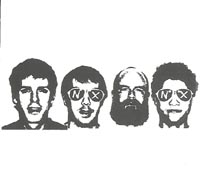 The Nix
The Nix EP
The legend is that The Bedpans saved up their returnable bottles to fund the release of their great EP, and inspecting the insert to the Nix record it seems these lads opened a cleaning service to bankroll their new band's vinyl. The one-sided platter serves up four snotty jams that prove that they've been studying their Queers (that is, before they reformed) and Insults records. It's a refreshing change of pace in the computer age to find a good record with a classical punk aesthetic: cut and paste graphics with white-out as a writing utensil. This has the feel of a blink-and-you'll-miss-it record, and something tells me these boys didn't cut it in the vacuuming industry, so I wouldn't put my money on a repress. Totally great.
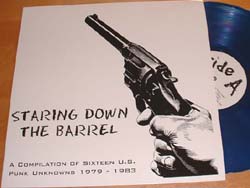 Staring Down the Barrel
Staring Down the Barrel compilation LP
The title seems a reference to the fact that we're looking at the bottom of the barrel as far as unknown punk records are concerned, but whoever was responsible for the digging that unearthed these gems certainly struck some gold. Most of the sixteen records comped here are sleeveless, and the few others have horribly un-punk sleeves (Ducky Boys being the exception though I guess the Exit sleeve isn’t too bad) which, along with low pressings, helps make sense of how these tunes remained under the radar for so long. Astute collectors may recognize The Grackles, whose name has been popping up on want lists in the last few years, but their appearance here is the first chance for most to actually hear the record. "Who Needs Wildlife Anyway" is a solid addition to the canon of "KBD classics"—from Albuquerque, NM, far from anything close to a punk scene, the tune is cluelessly over the top with lyrics to match ("Who needs wildlife anyway? / All they do is eat oats and hay / All they do is run around and play"). It's a shame that the MP3s I heard of the other songs didn't compare. The biggest surprise on the comp is Mind Games, who haven't been spotted on any want lists (until tomorrow). Their classically SoCal punk homage to "Get Smart" leads me to believe that those guys currently spend many hours watching Nick at Nite. Perhaps my favorite song on the record, and the one that I'll end up chasing down until I own, is the Ducky Boys' "Hooked on Junk." It's an undeniably possessed track that's young, loud, and snotty enough that it makes the Dead Boys sound like Stiv's solo records. Yow. Other winners include Chicago punk thuggery by JT IV; a great Damned-influenced track from Neck Tie Party; and The Ones, yet another great punk-edged basher in classic Milwaukee fashion. The record is not without fault: the Principles track sounds like a Cheech and Chong outtake (funny the first few times but a regular ‘skipper’); Scarecrows is a failed attempt at humor and lacks any remarkable tune; and I still don't understand why Screaming Sneakers haven't landed a spot on one of these comps— pop or not they smoke the Psychotic Frogs. All in all, "Staring Down the Barrel" is a great comp that should shut up anyone who thinks that all the great punk records have already been discovered.
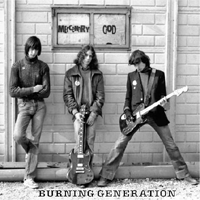 Mercenary God
Mercenary God "Burning Generation" LP
Here’s another mystery reissue that makes me want to hug whoever discovered this recording. My knowledge of Mercenary God is strictly limited to what I can figure out from the sleeve of this record (no insert or further info): They were an Italian trio who recorded 11 songs in 1981 that vanished into obscurity, and the drummer was either blessed by god or stuck a pear down his pants right before the photo shoot for the album cover. The music here is outstanding thug-punk that has a similar feel to the debut Cock Sparrer album (the one before “Shock Troops” when they still worshipped Slade), Germany’s Pack, or early Pekinška Patka. The album opens up with a slag off to disco that’s probably a few years too late, but is as good as anything that was timelier. The side continues with five more mid-paced anthems. The flip has three tracks in the same style, but adds a few slower, Joy Division inspired tunes. Albums like this serve as a great reminder that there will always be brilliant punk recordings hiding under beds waiting to be found.
Contact me at: cheaprewards@gmail.comReturn to cheap rewardsReturn home
|